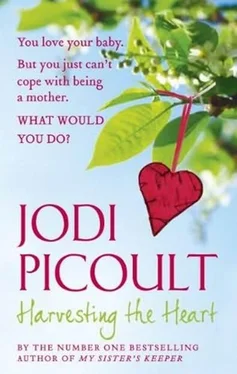My father had said I looked like her, but it had been twenty years since he’d seen her and eight since he’d seen me, so he might have been mistaken. I knew from her clothes that she was taller and thinner. I knew from Eddie Savoy how she’d spent the past two decades. But I still didn’t think I’d be able to spot her in a crowd.
The more I drove, the more I remembered about my mother. I remembered how she tried to get ahead of herself, making all my lunches for the week on Sunday night and stowing them in the freezer, so that my bologna and my turkey and my Friday tuna fish were never fully thawed by the time I ate them. I remembered that when I was four and got the mumps on only the right side of my face, my mother had fed me half-full cups of Jell-o and kept me in bed half the day, telling me that after all, I was half healthy. I remembered the dreary day in March when we were both worn down by the sleet and the cold, and she had baked a devil’s food cake and made glittery party hats, and together we celebrated Nobody’s birthday. I remembered the time she was in a car accident, how I had come downstairs at midnight to a room full of policemen and found her lying on the couch, one eye swollen shut and a gash over her lip, her arms reaching out to hold me.
Then I remembered the March before she left, Ash Wednesday. In kindergarten, we had a half day of school, but the Tribune was still open. My mother could have hired the baby-sitter to take care of me until she came home, or told me to wait next door at the Manzettis’. But instead she’d come up with the idea that we would go out to lunch and then make afternoon Mass. She had announced this over the dinner table and told my father that I was smart enough to take the bus all by myself. My father stared at her, not believing what he had heard, and then finally he grabbed my mother’s hand and pressed it to the table, hard, as if he could make her see the truth through the pain. “No, May,” he’d said, “she’s too young.”
But well after midnight, the door to my room opened, and in the slice of light that fell across my bed I saw the shadow of my mother. She came in and sat in the dark and pressed into my hand twenty cents, bus fare. She held out a route map and a flashlight and made me repeat after her: Michigan and Van Buren Street, the downtown local. One, two, three, four stops, and Mommy will be there. I said it over and over until it was as familiar as my bedtime prayers. My mother left the room and let me go to sleep. At four in the morning, I awoke to find her face inches away from mine, her breath hot against my lips. “Say it,” she commanded, and my mouth formed the words that my brain could not hear, stuffed as it was with sleep. Michigan and Van Buren Street, I murmured. The downtown local. I opened my eyes wide, surprised by how well I had learned. “That’s my girl,” my mother said, cupping my cheeks in her hands. She pressed a finger to my lips. “And don’t tell your daddy,” she whispered.
Even I knew the value of a secret. Through breakfast, I avoided my father’s gaze. When my mother dropped me off at the school gates, her eyes flashed, feverish. For a moment she looked so different that I thought of Sister Alberta’s lectures on the devil. “What’s it all for,” my mother said to me, “without the risk?” And I had pressed my face against hers to kiss her goodbye the way I always did, but this time I whispered against her cheek: One, two, three, four stops. And you’ll be there.
I had swung my feet back and forth under my chair that morning, and I colored in the pictures of Jesus outside the lines because I was so excited. When Sister let us out at the bell, blessing us in a stream of rushed words, I turned to the left, the direction I never went. I walked until I came to the corner of Michigan and Van Buren and saw the pharmacy my mother had said would be there. I stood underneath the Metro sign, and when the big bus sighed int he±€†o place beside the curb, I asked the driver, “Downtown local?”
He nodded and took my twenty cents, and I sat in the front seat as my mother had said, not looking beside me because there could be bums and bad men and even the devil himself. I could feel hot breath on my neck, and I squeezed my eyes shut, listening to the roll of the wheels and the lurch of the brakes and counting the stops. When the door opened for the fourth time, I bolted from my seat, peeking into the one beside mine just that once, to see only blue vinyl and the lacy grate of the air conditioner. I stepped off the bus and waited for the knot of people to clear, shielding my eyes from the sun. My mother knelt, her arms open, her smile red and laughing and wide. “Paige-boy,” she said, folding me into her purple raincoat. “I knew you’d come.”

I had asked a man with spare tufts of gray hair, who’d been sitting on a milk can at the side of the road, if he’d heard of Farleyville. “Yuh,” he said, pointing in front of me. “You almost there now.”
“Well,” I said, “maybe you’ve heard of a salon called Bridal Bits?”
The man scratched his chest through his worn chambray shirt. He laughed, and he had no teeth. “A sa-lon,” he said, mocking my words. “I don’t know ’bout that.”
The corners of my mouth turned down. “Could you just tell me where it is?”
The man grinned at me. “If it be the same place I’m thinking of, and I’m bettin’ it ain‘t, then you want to take the first right at the ’baccy field and keep goin’ till you see a bait shop. It’s three miles past that, on the left.” He shook his head as I stepped back into the car. “You said Farleyville,” he said, “di‘n’t you?”,
I followed his directions, messing up only once, and that was because I couldn’t tell a tobacco from a corn field. The bait shop was nothing but a shack with a crude fish painted on a wooden sign in front of it, and I wondered why people would come all the way out here to buy wedding gowns. Surely Raleigh would be a better place. I wondered if my mother’s shop was secondhand or wholesale, how it could even stay in business.
The only building three miles down on the left was a neat pink cement-block square, without a sign to herald it. I stepped out of the car and pulled at the front door, but it was locked. The big show window was partially lit by the setting sun, which had come up behind me as I drove, to wash over the tops of the tobacco plants like hot lava. I peered inside, looking for a seed-pearl headpiece or a fairy-tale princess’s gown. I couldn’t see beyond the showcase itself, and it took me a minute to realize that set proudly behind the glass was a finely stitched saddle with gleaming stirrups, a furry halter, a spread wool blanket with the woven silhouette of a stallion. I squinted and then I moved back to the door, to the handwritten sign I hadn’t noticed the first time. BRIDLES & BITS, it said. CLOSED.
I sank to the ground in front of the threshold and drew up my knees. I rested my head against them. All this time, all these miles, and I’d come for nothing. My thoughts came in waves: my mother wasn’t working her up±€†e; she was supposed to be at a completely different kind of store; I was going to have Eddie Savoy’s head. Pink clouds stretched across the sky like fingers, and at that moment the final streak of sun left in the day lit the inside of the tack shop. I had a clear view of the mural on the ceiling. It matched like a twin the ceiling I remembered, the one I’d painted with my mother and had lain beneath for hours, hoping that those fast-flying horses might champion us far away.
Читать дальше













